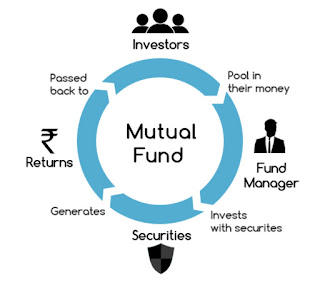What is Mutual Funds - tradecareer.blogspot.com
What is mutual fund
INTRODUCTION
Mutual fund is a process of pooling resources from the investors and investing funds in securities. The process of pooling the resources together and. issuing units to the investors and then investing funds in securities is known as the scheme of "Mutual Funds".
In other words, it works like a trust which pools the savings of investors and invests these in capital and money market instruments. Mutual funds offer good investment opportunities to the investors. Like all investments, they also carry certain risks.
Primary Players
* Sponsor: A sponsor is the one who establishes the Mutual Fund. He is the promoter of
the Mutual Fund. The sponsor is required to invest at-least 40% of the Net worth of the
mutual fund.
* Trustees: Trustees are the ones who hold property of the Mutual Fund, for the benefit of
the unit holders. The trustee can be an individual person or a company.
* Asset Managing Company (AMC): AMC is a company registered under the Companies
Act, 2013 registered with SEBI. AMC is entrusted with the responsibility of managing the
various schemes and operations of the Mutual Fund. It decides how to invest the funds
of mutual fund. The AMC is the investment manager of the trust.
* Mutual Fund: It is formed under India Trust Act and registered with SEBI for sale of
units of mutual funds to the public which pools the funds of unit holders.
* Unit holders: The person who holds the units of mutual fund is known as Unit Holder.
Secondary Players (Intermediaries of Securities Market)
Custodian: The custodian has the custody of all the shares and various other securities
bought by the AMC. The custodian is responsible for the safe keeping of all the
securities. It is registered with SEBI.
Transfer Agents: Registered with SEBI to facilitate issue, redemption and transfer of
securities. They maintain updated investment records.
Depository: Depository holds the units in De-mat form to ensure free flow of mutual fund
trade.
ADVANTAGES OF MUTUAL FUNDS
* Professional Management: The funds of Asset Management Company (AMC) are
managed by the experience and high caliber professionals who are backed by the
dedicated research team. The research team analyses the performance and prospects
of the companies for purpose of investments of funds.
* Diversified Investment: The AMC diversifies the total funds into different sectors or
industry for reducing the risk. In short, diversification of funds reduces the risk of
investment.
Return Potential: Mutual funds provide higher returns as they invest in a diversified
basket of selected securities.
* Low Cost: If we compare this form of investment with the other forms, the mutual funds
are less expensive, because the economies of scale is achieved in brokerage, custodial
fee, etc.
* Transparency: It provides regular information to the investors about the value of their
investment.
* Liquidity: The open ended mutual funds are very liquid and it can be easily encashed by
the investors. Even the close ended schemes are tradable in the securities market.
* Tax Benefits: Many mutual funds are tax exempt under section 80C of the Income Tax
Act.
* Protection to the interest of Investors: Being regulated by the SEBI, mutual funds
have to comply with the strict rules and regulations designed to protect the interest of the
Investors.
DISADVANTAGES OF MUTUAL FUND
Mutual funds may face the following risks, leading to non-satisfactory performance:—
1. Excessive diversification of portfolio, losing focus on the securities of the key segments.
2. Too much concentration on blue-chip securities which are high priced and which do not
offer more than average return.
3. Necessity to effect high turnover through liquidation of portfolio resulting in large
payments of brokerage and commission.
4. Poor planning of investment returns.
5. Unresearched forecast on income, profits and Government policies.
6. Fund managers being unaccountable for poor results.
7. Failure to identify clearly the risk of the scheme as distinct from risk of the market.
8. Under performance in comparison to peers.





Comments
Post a Comment